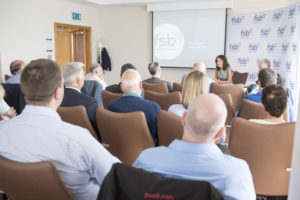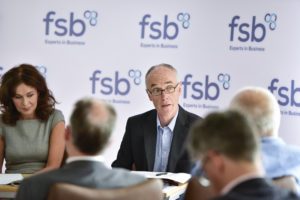Last week, the Federation of Small Businesses (FSB) hosted two Brexit Focus Groups, which were conducted in partnership with Ulster University. The first took place in Derry/Londonderry, close to the Border, and the second two days later in Belfast. The purpose of the two events was to hear directly from business owners the pros and cons of various customs and trading options which have been proposed in the Brexit negotiations to date, while also providing the space to promote ideas that ensure Northern Ireland maximises the opportunity provided by its unique position. Professor Deirdre Heenan and Dr Eoin Magennis from Ulster University, Conor Houston, Director of Houston Solutions, and Sonali Parekh, FSB UK Head of Policy, gave presentations which set the political, economic and social context for the discussions.
As a grassroots, member-led organisation FSB is guided by the policy direction set by its 6,000 members in Northern Ireland, therefore data gathered from the Focus Groups will inform our engagement with government on Brexit going forward. SMEs in Northern Ireland employ more people than the entire public sector and all larger businesses combined, and account for over 70 per cent of private sector turnover, so they have a keen interest in the final Brexit deal. The knowledge provided from people who run businesses can often give a very different insight from that received from policy analysts and Brexit commentators. It was made clear by the local business owners that any additional barriers to trade, either with the EU27 or with Great Britain, would have substantial negative consequences for businesses in Northern Ireland. This was particularly true for sectors such as agri-food, where products are especially time sensitive.

What became apparent from the deliberations was that businesses will always look to identify the opportunity in any change. While the challenges of Brexit are well documented and real, there was a clear appetite throughout the sessions to maximise any opportunity that Northern Ireland may have after we leave the EU. The uniqueness of Northern Ireland’s position – constitutionally within the UK, but located on the island of Ireland, and containing citizens who hold British, Irish or dual citizenship – has often been cited as a challenge in the Brexit conundrum, however, if viewed strategically, it could become a significant opportunity. Across both Focus Groups there was a strong belief that Northern Ireland’s uniqueness should be respected in the final settlement.
One idea that did gather considerable support was that of making Northern Ireland an enhanced economic zone or ‘freeport’, acting as the bridge between the EU and UK markets, while enjoying unfettered access to both. While some commentators could suggest that this amounts to Brexit ‘cakeism’ (having and eating), the challenge of Northern Ireland is not a case of ‘fire or flood’; instead, it is a ‘people problem’ that requires people to agree how they want to work together. With the right political will and pragmatism shown by all actors, the challenges can be overcome. We have a unique history of negotiations in this place, and recent history shows us that we have conquered much more seemingly intractable problems than frictionless trade.
It is crucial that our unique circumstances are recognised by all sides in negotiations, and that those involved are prepared to devise pragmatic, realistic and innovative solutions to support small businesses throughout these islands to continue to trade with each other unhindered. While Northern Ireland has historically experienced lower growth than other parts of the UK and Ireland, and continues to rely on a subvention of around £10billion from Westminster each year, with the right ambition and political solution it could, instead, become a driver of enterprise. From these engagements with business owners it was clear that there is both the potential and desire to make the most of the post-Brexit landscape and create a more prosperous future for everyone.

